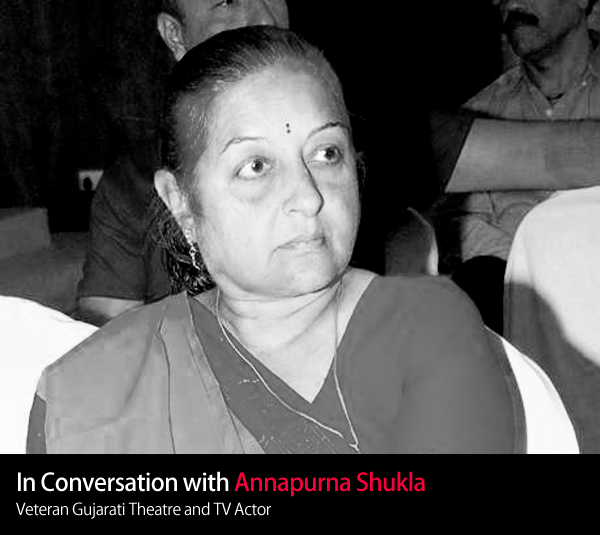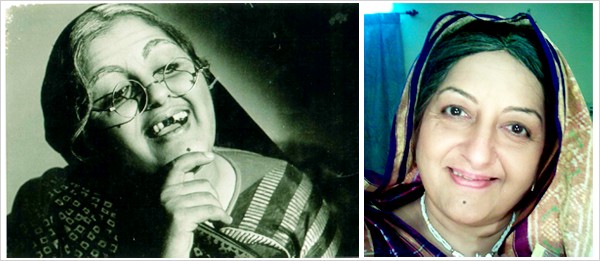On the occasion of World Theatre Day, OoWomaniya reached out to Annapurna Shukla, veteran Gujarati theatre actress, and a recipient of Gaurav Puraskaar.
A Theatre, TV, Radio and Film actress, she has been active on stage of performing arts since more than 50 years.
In conversation with Abhimanyu Acharya, Shukla with great gusto, talks about her career, scenario of theatre and women’s role in it, and also comments about women’s health issues.
Excerpts:
A.A. Tell us about your career in theatre. How it started and developed?
A.S. My journey in theatre started at a very early age. I was two and a half years old when I acted in my first play “Dhingli”, in which I played the lead role of a doll. May be drama was always a part of me. I couldn’t stay away from it. I was engaged in theatre during my High School and college days. But I got my first big commercial break at the age of 17, and then one thing led to the other and some really good work came my way.
A.A. Which kind of plays did you do?
A.S. I did a variety of plays, and that too in different languages. I preferred taking up roles which had layers and which were multi-dimensional. I got a chance to act in Gujarati, Hindi, English, and Sanskrit dramas. It has been a wonderful experience.
A.A. What are your comments regarding overall scene of theatre. Has it changed over years?
A.S. Definitely. Various experiments are being done in theatre now, which was not done before. It has improved in terms of quality as well as quantity. But the sad part is that people are using theatre only as a stepping stone towards serials and films. A disturbing development has happened that the actors are drawn into addiction and substance abuse now, and have developed a carefree attitude towards their fitness. The blind race for money has snatched away many promising actors from theatre. Something needs to be done about it.
A.A. How was the scenario of women in theatre when you started? And how is it now?
A.S. When I started it was really difficult to get into theatre at that time for women. Women were considered house-keepers and their job was to cook, sweep, sleep and bear children. Women during that time didn’t even think of getting into theatre. But now, fortunately, the scene has completely changed. Now they are accepted in theatre and are looked at with respect. Before, women were caged, but now sky is the limit for them. I feel very happy when I see young girls acting and performing in theatre.
A.A. Tell us your views regarding motherhood. Did your life change after you became a mother?
A.S. Ohh! I can talk for hours about that (Smiles). Yes, becoming a mother was really wonderful. Makrand (her son) was a dream child for me and my husband. Becoming a mother made me confident. I hate it when people talk about equality between men and women. It is pointless. Women are far ahead of men, because women give birth to all men. My life changed completely after I was a mother. It was difficult to manage professional life and family life together, but with the support of my family I was able to balance between both the lives satisfactorily.
A.A. What are your thoughts about intimate health of women? Are Indian women brave and bold enough to talk about their intimate health issues?
A.S. No. We still hesitate to talk about things like menstruation, pregnancy etc. These words are still tabooed in society, I don’t know why. People should come out, talk about it and seek help instead of silently bearing the pain and ignorance. I am glad to see organizations like OoWomaniya.com working towards this direction, making women outspoken regarding their issues and providing authentic guidance. Keep it up. This is a much-needed initiative.
A.A. Thank you Ma’am. Our readers would like to know something about your latest film, your latest play and your latest serial.
A.S. The last serial I did was a Hindi serial “Chan chan”. My latest play is ‘Malela Jeev’, based on the novel by Pannalal Patel. And my latest film is releasing on 4th April, “Whisky is risky”, a Gujarati film in which I play the role of a mother.
A.A. Lastly, before we part, on World Theatre day, what message would you give to young theatre artists?
A.S. I am against this idea of dedicating a single day to theatre, in the same way I am against dedicating a single day to women. Theatre is everyday. And we don’t need a day when people talk about women empowerment. All such non-sense should be stopped. And to the young people, I would say- Work hard, harder and still harder. Stay away from addiction. “Men may come, men may go, but I go on forever.” One should go on forever in theatre. That’s it.






,